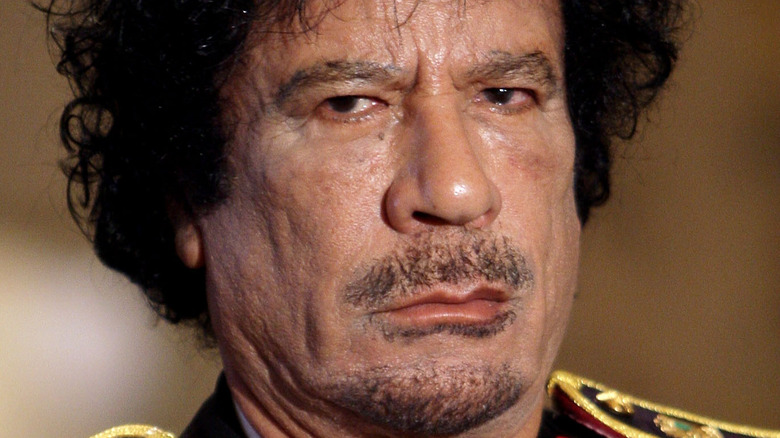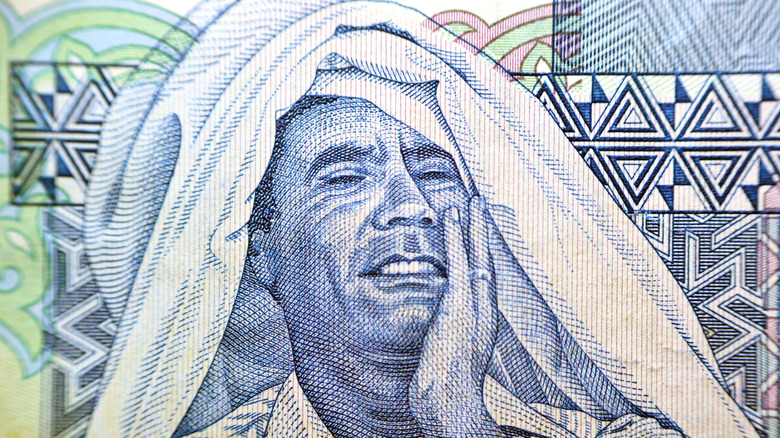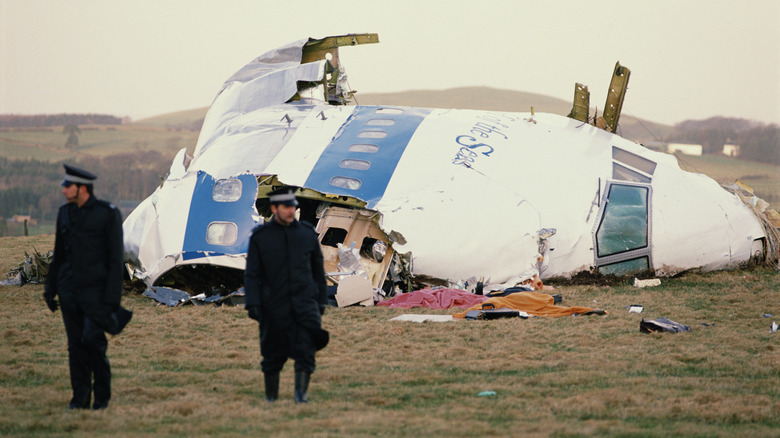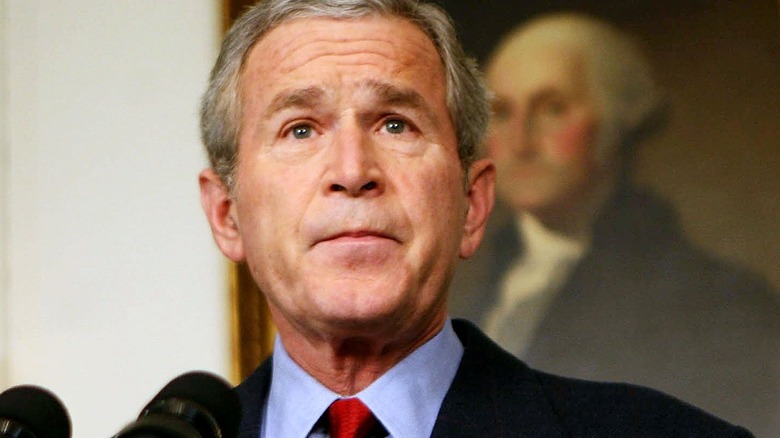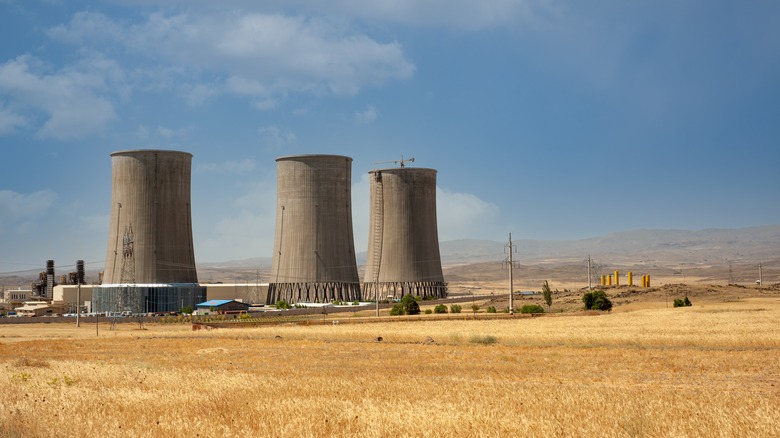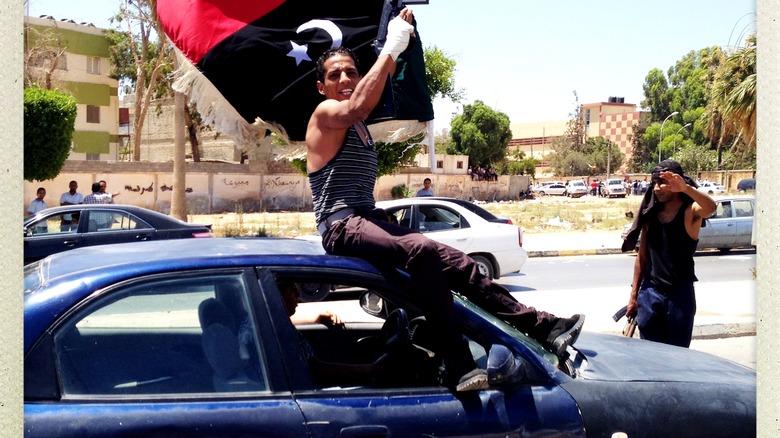Why Did Muammar Gaddafi Decide To End Libya's Nuclear Weapons Program?
Late in 2003, when the United States was still freshly mired in the Iraq War, the George W. Bush White House made an unexpected announcement: Longtime dictator of Libya Muammar Gaddafi (seen above) had admitted to having a secret nuclear arms program and agreed to give it up. The New York Times reported Gaddafi ceded to American and British pressure, opening his famously closed-off country to the scrutiny of international weapons inspectors.
It was a remarkable volte-face for a leader who had feuded with Western governments for decades and who for years refused to admit that he had an "unconventional arms" program. The New York Times, citing Bush administration mandarins, claimed that Libya had, in fact, hidden a clandestine, illegal weapons program from outsiders since about 1983. This was also a remarkable coup for Bush. Speaking at a "hastily called" press conference, he announced that Libya could finally "regain a secure and respected place" in the world.
Show-stopping or a 'mad dog'?
To explain the bad blood between Libya and the West, we have to start with the real protagonist of this story — not George W. Bush, but Colonel Muammar Gaddafi.
A BBC biography of Gaddafi describes him as "show-stopping," "outlandish," "blunt," and "intelligent;" Ronald Reagan called him the "mad dog of the Middle East." Gaddafi was born to a poor, pastoral family in 1942 — in a tent in the desert, according to Britannica — when Libya was still an Italian colony. Ambitious and a fierce Arab nationalist, he rose through the ranks of the Libyan Army through the 1960s, dreaming of overthrowing Libya's king. In 1969 he struck. Taking the government and army under his personal control, he announced the birth of a new, revolutionary Libya and wrote a number of pamphlets on his proposed Arabist, anti-imperialist, quasi-socialist principles.
Sweeping around Libya in elaborate uniforms, eventually accompanied by a bodyguard of women soldiers, Gaddafi seized foreign-owned oil wells, denounced Israel, and made overtures to anyone who would listen: left-wing nationalists, conservative Islamists, pan-Africans. Meanwhile, he crushed domestic dissent, gathering all political power and a huge tranche of Libya's oil profits for himself.
No one writes to the colonel
But it was Muammar Gadaffi's sponsorship of terrorism that made Libya a pariah state on par with North Korea. His first foray was in the early 1970s, according to a BBC report, when he began sending ships full of military-grade weapons to the Irish Republican Army. Gadaffi considered Irish republicanism part of the worldwide struggle against colonization and empire, and thus his friend. Per Britannica, he would aid a number of African American groups for the same reason, including the Black Panthers.
In 1986, a nightclub in West Berlin, popular with American soldiers, was bombed; American intelligence blamed Libyan agents, and then-President Reagan ordered air strikes on Tripoli and Benghazi in retaliation (per BBC). Three years later, a civilian airplane, Pan-Am 103, blew up over Lockerbie, Scotland, killing 270 people. British authorities linked the massacre to two Libyans, whom Gaddafi refused to hand over. The standoff would last over a decade, cementing Gaddafi's reputation as a murderous rogue.
Nuclear secrets
Muammar Gadaffi's foreign excursions used fairly conventional arms (even counting the bombs). Nevertheless, his secret arsenals contained a number of internationally-banned weapons. The New York Times reports that when Gadaffi opened his arsenals to arms inspectors in December of 2003 — just before the 15th anniversary of the Lockerbie bombing — the inspectors found World War I-era mustard gas, which can kill or blind anyone exposed. They also found material to manufacture nerve gas. This, publication notes, had come from North Korea, a country that, as of 2022, continues to defy international human rights law and weapons protocol.
Much more serious, however, was the revelation that Libyan military facilities had developed centrifuges capable of processing enriched uranium, the key ingredient for nuclear bombs. Inspectors saw 10 such facilities across Libya, ready or almost ready for use (via The New York Times). It was, in other words, a tremendous change of heart on Gaddafi's part. The U.S. dropped many of its erstwhile sanctions in response. "When leaders make the wise and responsible choice, when they renounce terror and weapons of mass destruction, as Colonel [Gaddafi] has now done, they serve the interest of their own people, and they add to the security of all nations," said Bush.
Axis of evil
The world's rogue nations, particularly those with nuclear ambitions, were a fixation of George W. Bush's foreign policy. In his 2002 State of the Union address to Congress, Bush identified an "axis of evil" in Iraq, Iran, and North Korea (via The Washington Post).
These countries did not constitute an alliance like the Axis powers of World War II; Baathist Iraq and Shiite Iran despised each other, and North Korea blockaded itself from the world. Nevertheless, the trio made perfect villains for an administration that divided the world into good and evil. All three were hostile to America and the West, and all three were thought to have a nuclear weapons program, which elevated them past the other, lesser rogue governments of the world, like Cuba and Libya.
Bush never made progress in his effort to stop North Korea's nuclear ambition: In 2022, 14 years after his last term ended, the North Korean military tested eight nuclear missiles in a single day as a show of strength (per BBC). He had better luck with Iran. This was partly because Iran had offered America a gesture of sympathy during the invasion of Afghanistan; North Korea never engaged sympathetically as a rule, which made diplomacy futile. But as the Wilson Center points out, Bush used a carrot-and-stick approach to stop Iran's nuclear progress, and his offer to approve of Iran's admittance to the World Trade Organization was as important as sanctions in avoiding a war. Gaddafi, watching from Libya, took note.
Strategy and downfall
Muammar Gaddafi told the international community that he had turned over his unconventional weapons of his own free will. That hardly seemed credible. The fact was that the man who referred to himself as the "king of kings of Africa" and tried to erect a lavish Bedouin pavilion outside Donald Trump's house was cornered and scared. Nine months earlier, the United States had invaded Iraq on the (false) accusation that its own dictator, Saddam Hussein, was manufacturing "weapons of mass destruction." Gaddafi wanted to avoid a similar fate.
However, the tradeoff of Western beneficence was just as frightening. A Wilson Center expert recalls Saif al-Islam Gaddafi, the colonel's son and advisor, expressing concern that a non-nuclear Libya would be at risk of rebellion. As it turned out, Saif was right. As Britannica explains, the Arab Spring reached Libya in February of 2011, when the city of Benghazi rose up against Gaddafi. A civil war ensued, with NATO airstrikes supporting the rebels and mercenaries from the Sahel called in by the ailing, paranoid dictator. Rebels in Sirte captured him that October, beating and raping the colonel before finally shooting him dead.
